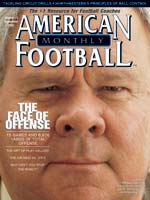AMERICAN FOOTBALL MONTHLY THE #1 RESOURCE FOR FOOTBALL COACHES
Article CategoriesAFM Magazine
|
Gorilla WarfareChuck Broyles’ Pittsburg State Gorillas’ SCARY Offensive Attackby: Matt Fulks © More from this issue Chuck Broyles doesn’t pretend to hold the “secrets” for winning. But through an aggressive style of play, a loyal staff and players, and an offense that works to stay one step ahead of defenses, Broyles and his staff have turned Pittsburg State (Kan.) into a perennial power in NCAA Division II. During the last 15 seasons, under Broyles, Pittsburg State is 154-30-2. The Gorillas have won the Mid-America Intercollegiate Athletics Association (MIAA) championships nine times, missed the Division-II playoffs only twice (1998 and 2002), and won the 1991 national championship. “We have a lot of fun,” said Broyles, who played at Pittsburg State in the mid-1960s and later was an assistant there for Dennis Franchione during 1988-89. “Sure it’s more fun when you win, but as coaches we try to make it a good experience f....The full article can only be seen by subscribers. Subscribe today!
|
|
|||||||
| HOME |
MAGAZINE |
SUBSCRIBE | ONLINE COLUMNISTS | COACHING VIDEOS |
Copyright 2025, AmericanFootballMonthly.com
All Rights Reserved





